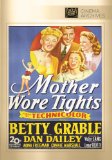| Reviews & Columns |
|
Reviews DVD TV on DVD Blu-ray 4K UHD International DVDs In Theaters Reviews by Studio Video Games Features Collector Series DVDs Easter Egg Database Interviews DVD Talk Radio Feature Articles Columns Anime Talk DVD Savant Horror DVDs The M.O.D. Squad Art House HD Talk Silent DVD
|
DVD Talk Forum |
|
|
| Resources |
|
DVD Price Search Customer Service #'s RCE Info Links |
|
Columns
|
|
|
Mother Wore Tights (Fox Cinema Archives)
A huge hit in its day, it's now harder to say why, exactly...but it's enjoyable enough, I suppose. 20th Century-Fox's Cinema Archives' line of hard-to-find library and cult titles has released Mother Wore Tights, the 1947 smash musical from Fox starring that studio's number one star, Betty Grable, along with Dan Dailey, Mona Freeman, Connie Marshall, Vanessa Brown, Robert Arthur, Sara Allgood, Williams Frawley, Michael Dunne, Sig Ruman, the voice of Anne Baxter (as narrator), and Senor Wences ("Okay?" "S'okay."). Based (however loosely) on the real-life vaudeville team of Frank and Myrtle Burt, Mother Wore Tights was 1947's fourth-most popular movie at the American box office (and Fox's top-grosser for the year). Trying to figure out how that happened is a tough one, but Grable is cute (rather than sexy, unfortunately), the costumes are colorful, and the songs are generally unobjectionable...and I guess that's enough. No extras for this okay fullscreen Technicolor approximation.
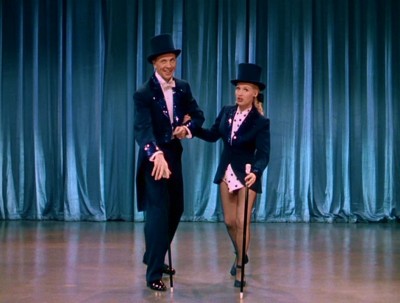
Oakland, California, 1900...when you could still walk the streets. High school senior Myrtle McKinley (Betty Grable) is the toast of Oakland High when she stars in the school's graduation pageant. Show business, though, is the last thing on her mind when she and her friends Bessie (Vanessa Brown) and Alice (Anabel Shaw) head to San Francisco, where Myrt, rather dispiritedly, plans on attending business college. A mix-up at the Schneider Opera House, when Bessie's ticket-taker brother lies to his boss (William Frawley) about the girls wanting to audition for the chorus, actually results in unexpectedly bold Myrtle spontaneously abandoning her dull secretarial career for the footlights and greasepaint. Several weeks in, she volunteers for headliner Frank Burt's (Dan Dailey) newest act...only to find out he's on the make--something about which her friend, tough showgirl Rosemary (Veda Ann Borg), warned Myrt. Frank, called out about his deception, proves to be, deep down, a nice guy, eventually convincing Myrt he genuinely thinks she has talent. They work up a successful double, with Myrtle secretly wanting it to be more, but selfish Frank is clueless to her feelings, and she leaves the act. However, when her own solo efforts don't pan out, she returns to Frank, who finally gets the message. The act is back on, and their marriage begins, with daughters Iris and Mikie soon born. However, Myrtle's intention to be a stay-at-home mother wanes as the girls get bigger; she goes out on the road with Frank, while her daughters, aside from a few summer months and Christmas every year, grow up mostly with Grandmother McKinley (Sara Allgood). As Iris (Mona Freeman) gets older, though, she becomes less enamored of her parents' show biz milieu, so it's off to finishing school...but will she ever learn to be proud of her parents?
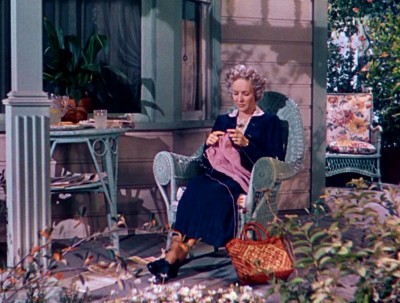
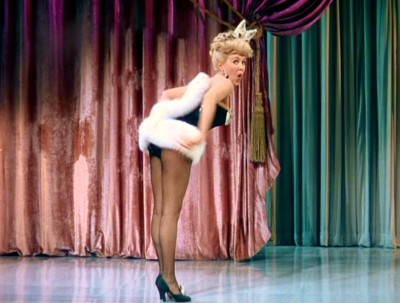
Just in the name of fairness and disclosure, when it comes to Fox musical stars, I always preferred Alice Faye to Betty Grable...but that's just a preference; it doesn't come down to "like/dislike" absolutes. I've seen a few Grable musicals (I always liked her with John Payne: Springtime in the Rockies, The Dolly Sisters), but interestingly, never her most popular--and her stated personal favorite--Mother Wore Tights. So I was primed to be wowed. If this was the movie that represented her at her absolute height with the audiences that adored her, it would seem to have to be a superior example of her canon, wouldn't it? Well.... From what I scanned on the web, Mother Wore Tights was apparently (very) loosely based on a real-life vaudeville team, Frank and Myrtle Burt, whose story was told in a popular book written by their daughter, Miriam. Fox bought the story as a potential vehicle for their biggest star at the time, Betty Grable. Grable had been knocking around various studios for almost ten years before she truly hit the big time in 1940, when Fox subbed her for ailing Alice Faye in Down Argentine Way, a smash hit. At first, Fox and Darryl Zanuck didn't concentrate Grable solely in musicals like Tin Pan Alley and Moon Over Miami, featuring her also in varied outings like A Yank in the RAF and the noir, I Wake Up Screaming (in which she's excellent).
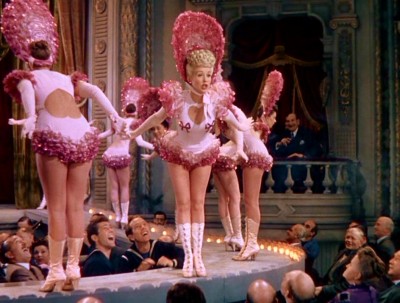
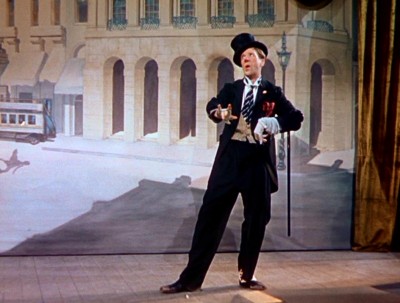
However, once war broke out, and American home front audiences wanted escapism more than ever, Grable's colorful, brash musicals like Song of the Islands, Footlight Serenade, Springtime in the Rockies, Sweet Rosie O'Grady, Coney Island, Pin Up Girl (where she cemented her status as WWII G.I.s' most popular pin-up), Diamond Horseshoe, and The Dolly Sisters, proved to be massive moneymakers for the studio, ensconcing Grable, by 1945, as Hollywood's highest-paid star (her publicity-worthy marriage to America's most popular bandleader, Harry James, didn't hurt her popularity, either). Time spent away from the big screen after the war ended--partly because she was on suspension when Zanuck flipped his lid at her refusal to star in his pet dramatic project, The Razor's Edge (she should have tried it)--proved dicey for her career when her first big musical, The Shocking Miss Pilgrim, lost money at the box office (some have said, somewhat illogically since it would have meant money out of Fox's pocket, that still-spiteful Zanuck was purposely trying to ruin her career when he refused in this movie to showcase Grable's million-dollar pins). Mother Wore Tights, her next outing, had seen a protracted pre-production, since Zanuck spent many months unsuccessfully trying sign first Fred Astaire from M-G-M, then James Cagney from Warners, to co-star (her appeals to cast previous co-star John Payne were rejected). Once contract player Dan Dailey was slotted in, the production faced another obstacle when Grable announced she was pregnant, causing the shoot to be sped-up before her condition was too noticeable. Audience, however, couldn't have cared less about any of this behind-the-scenes turmoil; when Mother Wore Tights was released in 1947, it proved to be Grable's biggest hit to date.
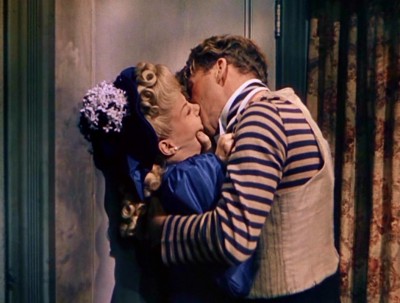
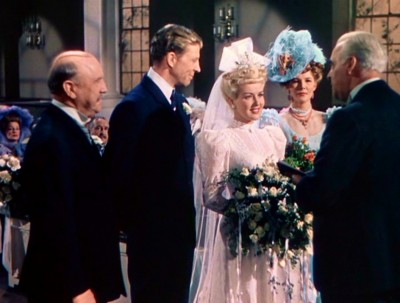
Watching Mother Wore Tights in this context, for the first 15 or 20 minutes or so you settle down into thinking the audiences back then were right. Opening with Grable and Dailey in old age makeup, idyllically whiling away the time on a front porch as uncredited Anne Baxter as a grown-up Miriam narrates ("This is mother. Isn't she sweet?"), ace Fox scripter Lamar Trotti (In Old Chicago, Alexander's Ragtime Band, Drums Along the Mohawk, The Ox-Bow Incident, Captain from Castile) has a funny cut to younger Grable, hoofing like mad, flashing those fabulous legs as Baxter, in that cool, low voice of hers, mock exclaims, "Good heavens, who ever dreamed she behaved like this? Mother, how could you?" as Grable bumps out her equally impressive rear to slide whistle accompaniment. It's quite an amusing contrast, priming us for a musical that might be as ironic as it is spirited. However, a slightly nagging suspicion that all is not right is immediately raised when Trotti and director Walter Lang follow up the same joke with Dailey. Baxter calls the dozing, elderly Dailey "the subtle type," so we're ready for something really wild in his youth flashback...before we're shown supposedly crazy young Dailey perform the sleep-inducing Burlington Bertie from Bow number (they compound the problem by having Grable do the same number later...to exactly the same somnambulant effect). The movie gets back on track when Grable is swiftly brought into the show biz world, with a witty scene featuring hard-boiled William Frawley sizing up the surprisingly brave high schooler ("Alright...let's see your legs," he growls as Grable obliges...up to the knees, for Frawley's stunned reaction), and a subsequent laugh-out-loud sequence that has Grandmother McKinley smacking a fresh sailor over the head with an umbrella, to the general hilarity of the surrounding audience, when Grable's grandparents come to see her perform in the Schneider Opera House's raucous, revealing chorus line. So far, so good.
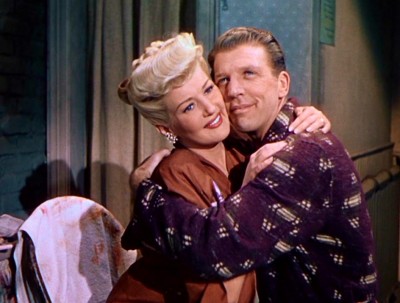
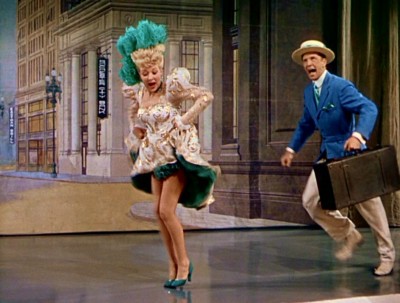
And yet, almost immediately after this, Mother Wore Tights gets bogged down in a tedious, familiar "backstage romance"/saccharine "show biz family" framework, punctuated by indifferent musical numbers that are almost antediluvian in terms of square quaintness. Dailey's big number, You Do, is set up to establish what a rakish talent he is to capture Grable's eye. However, the flatly pleasant Dailey comes over as more enthusiastic than actually accomplished in the number, with sometimes sloppy execution and a genial but distinctly non-"star power" presence. You can see why Zanuck held out as long as he could for either Astaire, who was like a laser surgeon with his moves, or Cagney, whose raw energy and sheer star wattage eclipsed any minor technical deficiencies in his previous on-screen hoofing (and maybe that's why Grable preferred lesser lights like Dailey and John Payne to co-star with her in these kinds of outings...so as not to be overshadowed). Then, the protracted, seen-it-all-before courtship begins (at an extended, pokey 107 minutes, Mother Wore Tights is at least 20 minutes too long) before they're a double act again (Dailey's rather violent kiss-into-submission for a raging Grable is about the only "real" scene in this long sequence...and ironically, it's totally out of place with the movie's overall sweet tempo).
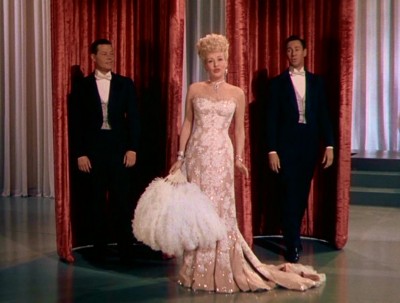
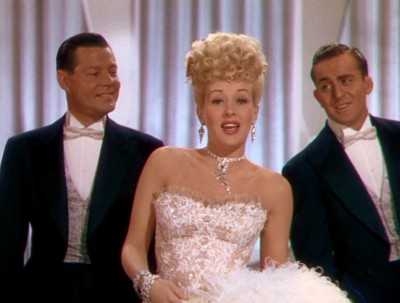
Once becoming an act together, the musical proper starts...and it's rather shocking to see how flat those production numbers are here. I don't know how much influence director Walter Lang (Tin Pan Alley, State Fair, Cheaper By the Dozen, Can-Can, Snow White and the Three Stooges)--never the most visually dynamic director to begin with--had over the actual staging and execution of these numbers, but they're dispiritedly square. With an upfront, rigid presentational style as Dailey and Grable sing right into the camera, we can't help but notice, once the general mediocrity of most of the songs sinks in, that the backdrops are ridiculously spartan (check out the boring curtain backdrop for the movie's best song, Kokomo, Indiana: this is a lavish musical?) and the choreography fairly non-existent except for furious bursts of hoofing now and then. Alarmingly, the movie then largely abandons its vaudeville backdrop for domestic trials involving the apparently guilt-free parents leaving those two adorable girls behind while they pound the boards, and then a tortured third act about Mona Freeman incongruously becoming a snob, embarrassed by her parents' profession. It's a rather heavy-handed way to capriciously kill two birds with one stone: crappy parents Grable and Dailey get to shuffle off audience blame on ungrateful brat Freeman, who then functions as the only discernible dramatic conflict in this meandering mess of a third act, when Grable and Dailey have to prove they're worthy of Freeman's snotty new friends.
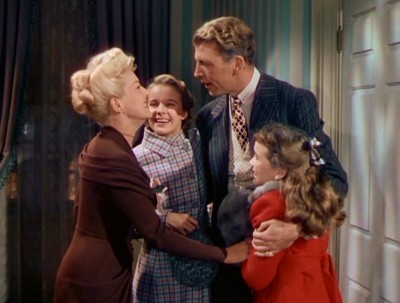
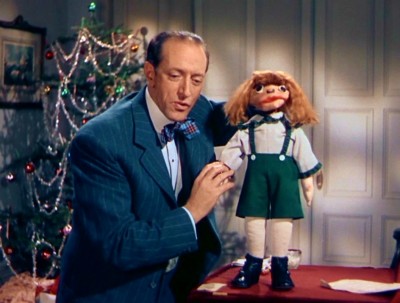
So...why, then, was Mother Wore Tights so popular with ticket buyers? Well, as much as I love Senor Wences, I don't think it was him (his hilarious specialty number is as entertaining as it is wholly arbitrary within the story). It's always tricky to try and figure out why a certain movie tickled a certain audience's fancy at a certain point in time, particularly when we're talking almost 70 years ago. It's a frequent cliche to always bring up the war as a convenient motivation for why some movies clicked or failed at the box office (as I believe I just did above...), but maybe that weary post-war feeling did have something to do with Mother Wore Tights's success. Stage-bound and homey, with a storybook, sanitized feel to it (like the scrapbook opening credits), maybe this exercise in sweet fantasy nostalgia was not unlike a bedtime story for exhausted children (Baxter's modulated, careful narration is delivered like a patient mother telling a small child a family fable). With grittier post-war themes gaining traction in more and more movies, musicals like Mother Wore Tights were the last hold-outs to the realities of how much the world had changed in just a few years. If audiences could take an unchallenging trip down a memory lane that never truly existed, with wholesome Grable and Dailey singing sunny songs about family dogs and kids with jam-smeared faces, well, then, why shouldn't they have...even if the movie itself was no great shakes? Maybe Mother Wore Tights's success was based as much on what audiences thought it stood for, or reflected what had passed in their imaginations, as it was on Grable's legs and her ice cream soda disposition. It's difficult to guess, when Mother Wore Tights gives you so little to go on in the first place.
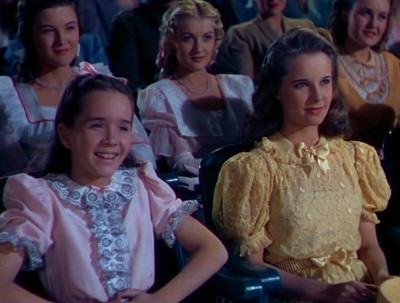
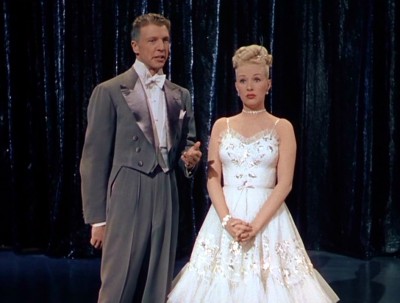
The DVD:
The Video:
The fullscreen, 1.37:1 color transfer for Mother Wore Tights is a fair--and only that--approximation of what must have been a riot of saturated tones in its original Technicolor glory. Registration is fine, but those reds don't really pop--a sure sign of fading. Image is clean and relatively sharp.
The Audio:
The Dolby Digital English mono audio track is clean, with little hiss and a decent re-recording level. No subtitles or closed-captions.
The Extras:
No extras for Mother Wore Tights.
Final Thoughts:
Why this was the fourth-most popular movie of 1947 is anybody's guess, but for what it's worth...it's just okay. Grable's sunny disposition and her full, healthy, pre-scrawny "starving Hollywood actress" body go a long way towards making the at-first promising then hopelessly square Mother Wore Tights bearable. And as such, Mother Wore Tights is recommended for Betty Grable's presence alone...the rest you'll forget an hour after you watch it.
Paul Mavis is an internationally published movie and television historian, a member of the Online Film Critics Society, and the author of The Espionage Filmography.


|
| Popular Reviews |
| Sponsored Links |
|
|
| Sponsored Links |
|
|
| Release List | Reviews | Shop | Newsletter | Forum | DVD Giveaways | Blu-Ray | Advertise |
|
Copyright 2024 DVDTalk.com All Rights Reserved. Legal Info, Privacy Policy, Terms of Use,
Manage Preferences,
Your Privacy Choices | |||||||









